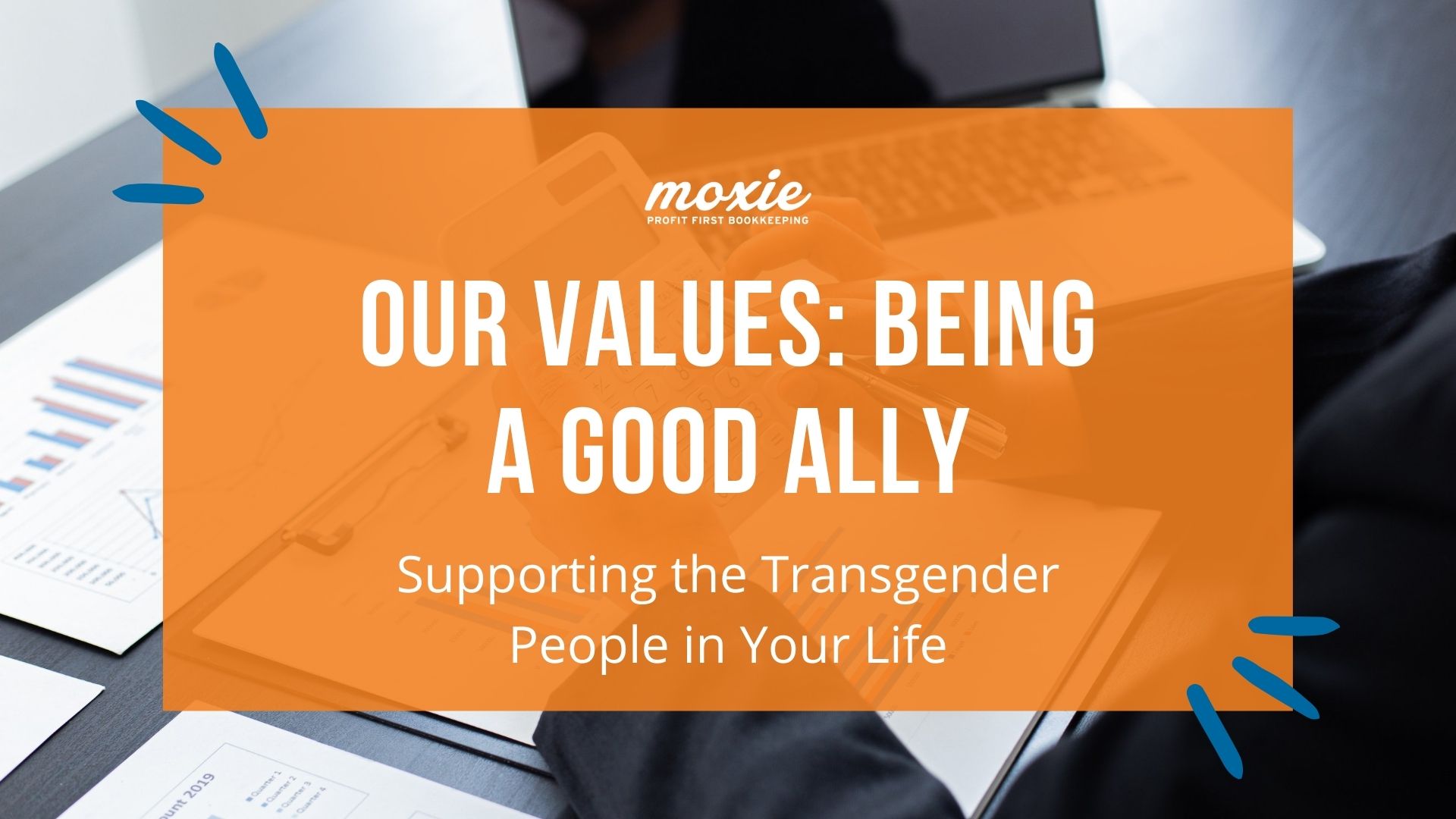Like most small businesses, we are passionate about not only what we do, but also the impact we have in the world. Our goal is to make the lives of our clients better while always adhering to our core values of social justice and empowerment.
At Moxie Bookkeeping, we believe in human dignity, agency, and equality. We believe that we should use our privilege to support and empower marginalized groups. We believe that our role is as a good ally.

Founded in 2003 by transgender activists who recognized the urgent need for policy change to advance transgender equality, The National Center for Transgender Equality is an important lobbying and educational group that has published a guide to being a good ally. Moxie Bookkeeping embraces our role as an ally and is committed to the tenets of this guide.
Some of the highlights of the guide to being a good ally are:
- Use the language a transgender person uses for themselves. No two transgender people are exactly the same, and different transgender people may use different words to describe themselves. You should follow the lead of each transgender person, as they will best know the language that is right for them.
- If you don’t know what pronouns to use, ask. A simple way to see what pronouns someone uses—he, she, they, or something else—is to wait and see if it comes up naturally in conversation. If you’re still unsure, ask politely and respectfully, without making a big deal about it. Sharing your own pronouns is a great way to bring up the topic—for example, “Hi, I’m Rebecca and I use she/her/hers as my pronouns. How about you?” If you accidentally use the wrong pronouns, apologize and move on. Making a big deal out of a pronoun mistake may be awkward and often draws unwanted attention to the transgender person.
- Speak out in support of transgender people and transgender rights. Politely correct others if they use the wrong name or pronoun for a transgender person. More broadly, it is important to challenge anti-transgender remarks, jokes, and conversations. It can be scary to speak out, but loud and visible support for transgender rights can show transgender people that they are accepted, encourage other allies to speak out, and help change the minds of people who aren’t supportive of transgender people yet.
- Think about how you use gendered language. Do you regularly greet groups by saying, “Ladies and gentlemen?” Do you have a coworker who refers to everyone as “guys?” Is there a particular gender-based joke your friend loves to tell? Many transgender people are fine being called “ladies” or “gentlemen,” but you can’t know without first asking. Consider changing your habits to avoid making assumptions about people’s gender or pronouns, and encouraging the people in your life to do the same. This can take time and effort but is an important way to be an ally and support transgender people outside of individual, face-to-face interactions.
- Rethink gender on forms and documents. When creating forms and documents, consider whether you need to include gender at all. Many times, we default to asking for gender without considering why or how that information will be used. If you do need to ask for gender information, consider using a blank space for people to fill in as they feel comfortable, rather than boxes marked “male” and “female,” or make it clear that people can fill in forms in a way that matches their gender identity.
- Craft a transgender-inclusive nondiscrimination policy. Shifting the culture of an organization takes time. Crafting a transgender-inclusive nondiscrimination policy can help clarify how your organization supports transgender people and ensure that there’s a way to respond to those who aren’t supportive.
- Learn about policies affecting transgender people. Are there any laws that protect transgender people where you live? Any policies at work or school that are inclusive of transgender people? It’s important to learn more about the challenges that transgender people face and the goals of transgender advocates, and, if you’re comfortable with it, even help push to change bad laws and policies or support good ones.
These are just some of the highlights of the full guide, but we feel they are an important place to start.

One of the keys to being a good ally is to educate yourself.
It is not the responsibility of any member of a marginalized group to “teach” you, especially in an age when so much good information is readily available to everyone. The National Center for Transgender Equality has put together a Frequently Asked Questions about Transgender People page on their site that is incredibly informative.
Another key to being a good ally is to make space for the voices of oppressed groups. Instead of inserting yourself into the conversation, use whatever platforms you have to amplify the voices of individuals with the lived experience.
The support and empowerment of traditionally marginalized groups is one of the values we hold at Moxie Bookkeeping. We are committed to being the best ally we can.
